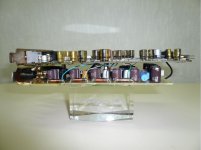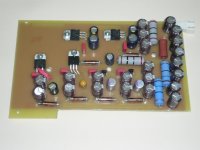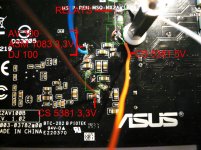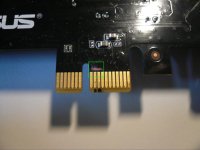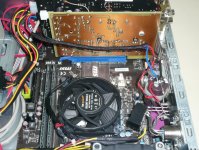Hi And thanks for reading.
I am plagued with weird noises from my asus stx2 soundcard, crackles, whistling noises.
What do you think of a pc ribbon riser card to physically move the soundcard away from the pc and all the interference.
https://www.ebay.co.uk/i/1241351624...MI_s3xxePa6AIVGeDtCh3OoQWhEAQYAyABEgJkPvD_BwE
Do you think there may be an improvement in sound quality, or is the noise i am experiencing mixed in with the audio signals so is too late to do anything about
Thanks.
I am plagued with weird noises from my asus stx2 soundcard, crackles, whistling noises.
What do you think of a pc ribbon riser card to physically move the soundcard away from the pc and all the interference.
https://www.ebay.co.uk/i/1241351624...MI_s3xxePa6AIVGeDtCh3OoQWhEAQYAyABEgJkPvD_BwE
Do you think there may be an improvement in sound quality, or is the noise i am experiencing mixed in with the audio signals so is too late to do anything about
Thanks.
I have so much equipment, a room full.
There is a series of power amps after the soundcard.
There is an overhead projector for the video,
then there is a playstation and screen a few feet away from,
then there is a nintendo wii and screen a few feet further.
Got so much equipment running, have always had buzzing noises.
So i was just wondering if the riser card would allow me to move the soundcard away from the pc, i could put it into an abs enclosure away from the pc's radiation.
Thanks!
There is a series of power amps after the soundcard.
There is an overhead projector for the video,
then there is a playstation and screen a few feet away from,
then there is a nintendo wii and screen a few feet further.
Got so much equipment running, have always had buzzing noises.
So i was just wondering if the riser card would allow me to move the soundcard away from the pc, i could put it into an abs enclosure away from the pc's radiation.
Thanks!
I think in your situation the smart thing to do would be to make sure it is radiation from the PC. That is extremely unusual for crackle etc.
Chances are it is something completely else.
An easy check would be to try/borrow another sound-card if you have one. If that is OK, it isn't your PC.
Jan
Chances are it is something completely else.
An easy check would be to try/borrow another sound-card if you have one. If that is OK, it isn't your PC.
Jan
Yeah, i have been plagued by noisy equipment for years, tired all of the on-line fixes but no improvement
On-line fixes are usually not working, because whoever gives the fix doesn't know your setup.
You can't get around doing your own digging and diagnosing. Go back to the bare minimum, the PC and the sound card, and see if that's OK. Then add more and more of the system until you find the culprit.
Jan
You can't get around doing your own digging and diagnosing. Go back to the bare minimum, the PC and the sound card, and see if that's OK. Then add more and more of the system until you find the culprit.
Jan
Thanks.
Done all that but no luck, must be coming from the neighbours or maybe there is a broadcaster.
What do you think of the riser card idea.
Done all that but no luck, must be coming from the neighbours or maybe there is a broadcaster.
What do you think of the riser card idea.
I am almost sure the riser will not help. I have played with extender cables, their effect is minimal.
You have a ground loop between your isolation class 1 PC and some of the class 1 equipment connected downstream. Since you cannot change your equipment, I would recommend a signal isolation transformer (e.g. https://www.ebay.com/sch/i.html?_from=R40&_nkw=ground+loop+audio+isolator&_sacat=0&rt=nc&LH_BIN=1, Amazon.com: Novosonics GL-1 Ground Loop Isolator 20AMP RCA connectors: Automotive , lots of other models). It may seem like it voids your expensive soundcard but measurements on internet show the signal transformer distortion is surprisingly small.
The moral of the story - it may be cost-effective to not buy an expensive soundcard for a desktop PC if your downstream equipment is class 1 and has no balanced inputs.
You have a ground loop between your isolation class 1 PC and some of the class 1 equipment connected downstream. Since you cannot change your equipment, I would recommend a signal isolation transformer (e.g. https://www.ebay.com/sch/i.html?_from=R40&_nkw=ground+loop+audio+isolator&_sacat=0&rt=nc&LH_BIN=1, Amazon.com: Novosonics GL-1 Ground Loop Isolator 20AMP RCA connectors: Automotive , lots of other models). It may seem like it voids your expensive soundcard but measurements on internet show the signal transformer distortion is surprisingly small.
The moral of the story - it may be cost-effective to not buy an expensive soundcard for a desktop PC if your downstream equipment is class 1 and has no balanced inputs.
A different option is to power the pc with a classic transformer, rectifier and capacitors, and a wide input picopsu.
Then ground the pc with a bridge rectifier in series using the AC terminals, and shorting the + and - terminals, this creates a two diode voltage drop in both directions, which cuts ground loops.
Then ground the pc with a bridge rectifier in series using the AC terminals, and shorting the + and - terminals, this creates a two diode voltage drop in both directions, which cuts ground loops.
Thanks! Do i have to put the isolator on all of the soundcard's rca outputs
It is a 7.1 card and has 8 rca sockets for sound outputing.
The inner connector of the rca socket is the live / signal hot, and the outer ring is the ground. With an ohmmeter, all of the rca grounds have zero ohms impedance between them.
It is a 7.1 card and has 8 rca sockets for sound outputing.
The inner connector of the rca socket is the live / signal hot, and the outer ring is the ground. With an ohmmeter, all of the rca grounds have zero ohms impedance between them.
Well, if you are actually using all of them, then you will obviously need as many line isolators as required to cover all channels.
What model power amplifiers are you using? I reckon at least some of those are Class I... (If so, do they possibly have any balanced inputs?)
BTW, I faintly remember something about the possibility of an internal ground loop (via the slot bracket?) when using the ST(X) 7.1 extension module... Not the smartest construction... Electrical contact of slot bracket to PC chassis seems worth checking in general.
What model power amplifiers are you using? I reckon at least some of those are Class I... (If so, do they possibly have any balanced inputs?)
BTW, I faintly remember something about the possibility of an internal ground loop (via the slot bracket?) when using the ST(X) 7.1 extension module... Not the smartest construction... Electrical contact of slot bracket to PC chassis seems worth checking in general.
Thanks!
Just checked the soundcard's rca ground to pc chassis ground with an ohm meter
and it is zero ohms,
so all the rca grounds are connected together and then connected to the mains earth
Just checked the soundcard's rca ground to pc chassis ground with an ohm meter
and it is zero ohms,
so all the rca grounds are connected together and then connected to the mains earth
If they were not connected you would not be getting the ground loop. There is no galvanic isolation between your soundcard and your PC, all the grounds are connected. But they do not have exactly same potential since there are large currents running between them, creating the noise voltage you hear.
Wow! Would have thought that a top end soundcard would take this into consideration.
What should my next move be.
Thanks
What should my next move be.
Thanks
I do not know about any PCI/PCI-e soundcard with galvanic isolation. Actually I know only about one RPi DAC board with isolated I2S/I2C. Plus a USB isolator can be used for any USB soundcard.
The noise on the ground loop is not caused by the soundcard but by the motherboard layout. It is not your soundcard's fault that your motherboard engineers decided to connect the PCI-e slot ground to a ground trace which also carries large currents for CPU/GPU/peripherals. My 2cents if the PCI-e slot ground trace led directly to one of the ATX ground wires dedicated just to this ground, your soundcard would be dead silent.
Actually I recall some PCI-e soundcard with independent power for the analog part, to be supplied by the Molex 4pin connector. That is a nice inexpensive workaround too.
The noise on the ground loop is not caused by the soundcard but by the motherboard layout. It is not your soundcard's fault that your motherboard engineers decided to connect the PCI-e slot ground to a ground trace which also carries large currents for CPU/GPU/peripherals. My 2cents if the PCI-e slot ground trace led directly to one of the ATX ground wires dedicated just to this ground, your soundcard would be dead silent.
Actually I recall some PCI-e soundcard with independent power for the analog part, to be supplied by the Molex 4pin connector. That is a nice inexpensive workaround too.
Last edited:
Thanks!
The rca grounds are all connected to the mains earth, could this be a problem?
Also, should i change the motherboard Do you know of any without the ground trace problem. Currently i am using the asus h170I-pro motherboard. Was expensive and top end when purchased slightly over a year ago. Would have thought with all the money they charged the board would have been well thought out.
Forgot to mention, I am using a second atx power supply to power the soundcard, it does not share the pc's power supply which is a 600watt corsair. I shorted the green and black wires together to make the soundcard's power supply switch on, then ran the 4-pin molex to the soundcard.
The rca grounds are all connected to the mains earth, could this be a problem?
Also, should i change the motherboard Do you know of any without the ground trace problem. Currently i am using the asus h170I-pro motherboard. Was expensive and top end when purchased slightly over a year ago. Would have thought with all the money they charged the board would have been well thought out.
Forgot to mention, I am using a second atx power supply to power the soundcard, it does not share the pc's power supply which is a 600watt corsair. I shorted the green and black wires together to make the soundcard's power supply switch on, then ran the 4-pin molex to the soundcard.
Last edited:
The rca grounds are all connected to the mains earth, could this be a problem?
Please read up a bit on the ground loop, e.g. Audio isolation transformers | or Solving Computer Audio Problems
This is a very comprehensive interesting material https://web.mit.edu/jhawk/tmp/p/EST016_Ground_Loops_handout.pdf
Also, should i change the motherboard Do you know of any without the ground trace problem. Currently i am using the asus h170I-pro motherboard. Was expensive and top end when purchased slightly over a year ago. Would have thought with all the money they charged the board would have been well thought out.
Changing the MB would be an expensive trial/error procedure. Plus it depends which PCI-e/PCI/USB slot you use. You can try relocating your soundcard, if it helps (unlikely).
Forgot to mention, I am using a second atx power supply to power the soundcard, it does not share the pc's power supply which is a 600watt corsair. I shorted the green and black wires together to make the soundcard's power supply switch on, then ran the 4-pin molex to the soundcard.
I see, your soundcard is the one with the power connector. If a separate PSU does not help, then the digital and analog grounds on the card are connected and the external supply not help with ground loops.
I had brutally jeopardized an asus stxII to make it work completely from a linear psu. I even bypassed the PCI-e traces for 3,3v. Great adventure and great sound. Still, the ground connections had to stay for it to communicate with the PC thus, the only way to overcome ground loop noise was to use ground lifters for the preamp/amp and that worked fine for me.
Attachments
I am actually powering my pcie soundcard with riser and linear ps. But It just lower the " noise floor". I think it is not a solution for your noise problem..
From my experience I heard similar noises when:
a bad solder joint in my diy amp.
or a faulty component(maybe a transistor, voltage regulator..).
Maybe this helps..
From my experience I heard similar noises when:
a bad solder joint in my diy amp.
or a faulty component(maybe a transistor, voltage regulator..).
Maybe this helps..
- Home
- Source & Line
- PC Based
- riser card for soundcard
